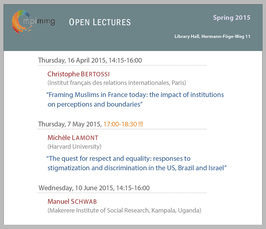"Framing Muslims in France today: the impact of institutions on perceptions and boundaries"
Open Lectures Spring 2015
- Date: Apr 16, 2015
- Time: 02:15 PM - 04:00 PM (Local Time Germany)
- Speaker: Christophe Bertossi (Institut français des relations internationales, Paris)
- Christophe Bertossi is the director of the Centre for Migrations and Citizenship at the Institut français des relations internationales IFRI, Paris.
- Location: MPI-MMG, Hermann-Föge-Weg 11, Göttingen
- Room: Library Hall

For more details please contact buethe(at)mmg.mpg.de.
Across Western Europe, public discourse has been suffused by claims about Muslims and Islam, and their supposed incompatibility with the values of European states. Addressing the matter, an extensive literature has emphasized the framing effect of national imaginaries and political traditions that are specific to a country, e.g. French republican assimilation and secularism (“laïcité”), British and Dutch multiculturalism, German ethno-nationalism, etc. This has also been linked to a new politics of national identity in these countries and a so-called “multicultural crisis” in Europe.
This lecture proposes to revisit the notion of a national culture of citizenship, but from a different angle. Moving beyond a perspective that sees in national cultures of citizenship and integration the central building blocks of comparative analysis, the lecture questions the ways in which institutions shape a sense of cultural citizenship. To do so, the lecture focuses on the case of France and compares two particular institutions: the armed forces and hospitals. It looks empirically at how social perceptions and cultural and moral boundaries concerning Muslims in France are constructed in the setting of these institutions, through the day-to-day routines of their members and the representations and practices they develop in their interactions with others they label as “Muslims.” The approach also emphasizes the role of Muslims (mostly soldiers and non-commissioned officers in the military and paramedics in hospitals) in this boundary-work and the framing of “laïcité” in both institutions. How and why has the French military developed strategies of cultural and religious accommodation in favor of Muslim soldiers? How have French Muslim soldiers reacted to these strategies? To what extent have Muslim nurses been able to negotiate their wearing of the veil during service hours? This cross-institutional comparison shows that what happens in the context of a regiment or a hospital in France cannot be easily encapsulated by pre-conceived notions of a French national philosophy of “laïcité” and republican “assimilation”.